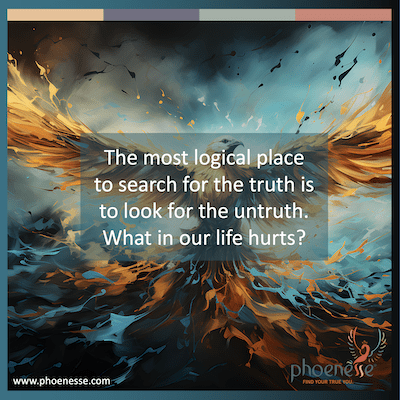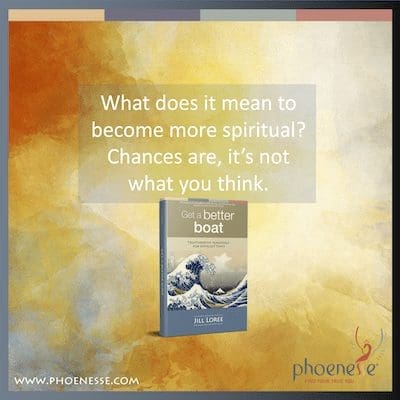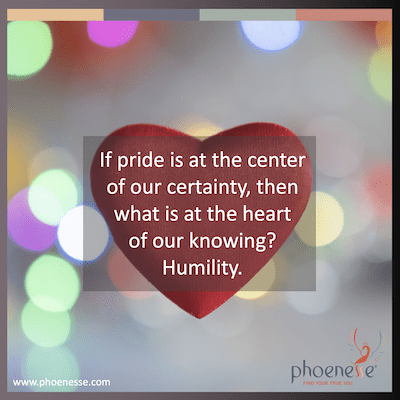
In my mid-30s, I was married with two adorable little boys, had a nice house and a good job. This wasn’t in my first job after college. Not even my second. I was actually on my sixth job in 12 years. And with each job change there was struggle and inner turmoil. The truth was, I had a seemingly good career going, but I was miserable. And for the life of me, I couldn’t figure out how to make it better.
One day, I had an epiphany. A blinding glimpse of the obvious, really. That there was a clear common denominator in all this pain: Me.
I had no idea what inside of me was leading me to one unhappy job situation after another. But I was unhappy enough to try to find out.
Which was just about the time someone handed me my first Pathwork lecture.
Two important truths
There are two very important truths to understand about what was unfolding here. First of all, we all have problems in life. But seldom do we realize that we ourselves are always at the root of them. Learning to appreciate self-responsibility, then, is key for finding our way out of misery.
But there is some really good news embedded in this understanding. Because if we are the problem, then we are also the solution. And if we can come to see how this could be so, life will make a lot more sense to us.
Second, truth will gladly reveal itself to us if we seriously search for it. And there is nothing we must believe for this to happen. Simply put, if we knock, the door will open.
Tremendous help is only a breath away. It arises organically from the core of our being where truth reigns, now and forever.
What can’t and won’t live forever is untruth. Because untruth always brings with it a heavy dose of struggle. And it’s this very struggle that, at some point, will cause us to turn around and face ourselves.
To find out the truth about what’s really going on in our lives.
The truth about untruth
The short answer to whether truth is hard to find is yes…and no. For we all have plenty of truth resting comfortably at the center of our soul in what the Pathwork Guide calls our Higher Self. But for humans, our Higher Self is covered over by layers of our Lower Self.
And therein lies the trouble.
Briefly, the Lower Self is made up of Higher Self qualities that have gotten twisted, or distorted. And what pins the Lower Self into place? Truth that has gotten twisted around into untruth.
Yes, friends, we all have some variety of untruth lurking inside our psyche. And we would all let this untruth reign forever, except for one thing: Untruth hurts. Buried untruth, in fact, is at the root of every disharmony we face in life.
It’s the nut.
If we can figure out how to go about cracking this nut, we will open to a whole new way of living and being.
How to find the truth
Across 250 lectures, and throughout thousands of Q&As, the Pathwork Guide gave us all kinds of help for healing the untruthful fragments of our psyches, to gradually restore ourselves to wholeness. You could even rightly say that the search for untruth—and more importantly, for how to correct it— is the whole point of incarnating.
But how? Where do we even start?
Believe it or not, the most logical place to search for the truth is to look for the untruth. We start by facing ourselves as we are right now.
Where are we struggling? What in our life hurts? Where is there disharmony, conflict, unhappiness?
For these are not random, unfortunate fates we can’t control. Rather, they are the natural results of untruth. Which turns our difficulties into steppingstones we can use to sort ourselves out and correct our misunderstandings about life. For truth be told, there are no innocent victims. And we only need to turn and face into our difficulties to realize this.
In the words of one famous spiritual teacher, it’s time to turn the other cheek. This means we stop looking “out there” for the source of our struggles and, instead, turn to look within ourselves.
The truth opens doors
Truth has way of opening doors. This includes both our inner doors and our outer connections with others. When we are in truth, we feel open, relaxed, free and loving. By contrast, when we feel anxious, angry, hateful or spiteful, there must be some untruth in us that we are overlooking.
To better understand this, let’s look at jealousy and explore both the truth and the untruth that it holds. Similar to envy, jealousy means something like, “You have something that I want, and what you have is something that I deserve.”
Buried in this thought is the misunderstanding that anyone else could ever have what truly belongs to us. And further, that for some reason, we can’t have what’s really our due. That we’re not getting what we deserve.
In truth, we might really and truly be deserving of some certain desirable thing. But if there’s a hidden belief inside us saying we can’t, won’t or shouldn’t have this, we are essentially saying No to such fulfillment. And this makes us feel jealous of what others have.
Further, it makes us rebel against the fact that we remain empty-handed. But the truth is, we will remain this way until we figure out how and why we are saying No to ourselves.
The truth about holding back
Often, the root of the problem is that we deny ourselves feelings of love and pleasure. We simply won’t let these feelings out. And, generally speaking, this is the basic human predicament.
We cut ourselves off from our true feelings, and then we cut ourselves off from seeing how we are doing this. And this makes us feel insecure. For when we cut ourselves off from our own center of gravity—from the truth that rests at the center of our own being—we make ourselves dependent on others.
This, in turn, makes us controlling and possessive, jealous and afraid.
We believe that if we can’t make others behave to our liking, we’ll be lost. But the reality is, we can’t make everything go as we want. We can’t control everything and everyone. Yet we’ve made ourselves dependent on them for our happiness.
As a result, we end up putting all our energy into controlling our world, rather than using our energy to bring out our own capacity to feel love. And keep in mind, to have loving feelings, we also need to have a strong, healthy ego.
When we have a weak ego, we need to constantly feed off others. We will use all our strength in the service of getting others to nourish us. Instead, we could be learning to nourish ourselves from the inner well of our own Higher Self.
The truth about giving and receiving
When there is jealousy, there is also an underlying unwillingness to give our best to whatever we are doing in life. Our main emphasis is to get, to receive. And then, maybe, if we get everything we want, we will give a little.
But life doesn’t work this way. When we won’t give, we also can’t receive; when we withhold ourselves, life can’t give us what we want. We then use this as an excuse to not give. Which is one reason we feel so much frustration.
For it’s in giving that we feel fulfillment.
Fulfillment is a not a reward. It’s not a holy, goody-goody feeling that comes from “being good”. That heaven will now reward us. Life is not like that.
Rather, a giving person is someone who is open and able to receive pleasure on all levels—physical, emotional, mental and spiritual. A giving person is someone who is living in truth.
The truth about blame
The frustration caused by our own ungiving attitude is what leads to jealousy and envy. It makes us want what others have. We’ve cut ourselves off from our inner authority, and we now think that what others have is way better than what we have. We deprive ourselves and then claim this is some kind of special injustice of life. It’s fate.
The only way out of this is to become more self-aware. We have to come face to face with our anger and our rage, our jealousy and our envy. For we are already feeling all these things, but we’re not allowing ourselves to acknowledge them.
Instead, we explain away these difficult feelings by pointing at others, and then we deny what we’re feeling. Now these feelings will surface in a more indirect way, making us even more confused about why we are so miserable.
No matter how much others give us, if we are blocking our own feelings, it won’t leave us feeling fulfilled or satisfied. For whenever we block our feelings because we don’t want to feel the hard feelings, we block ourselves from fully giving. And then life can’t give to us in return.
And in truth, we are the ones doing this to ourselves.
The truth about the cart and the horse
Here’s one more thing to think about that may open a new door of introspection. Jealousy, insecurity and competitiveness are all aspects of the same thing: Fear of our own feelings. We afraid to let them flow.
We rationalize this by putting the cart before the horse, which human beings are so prone to doing. In other words, we say that we feel afraid, insecure and jealous, and that makes us hold back our feelings. But in truth, it’s exactly the other way around.
The reason we are afraid of competition, full of jealousy and feel insecure is because we hold back our feelings. Deep in our soul, we tighten up and hold back. We feel a deep anxiety and fear, and we constrict ourselves. And that’s what creates the whole problem here.
If we want to really dissolve this and become capable of totally feeling the truth of this, we must make an inner decision to change. Frankly, we’ll have to do a lot of work on path such as the one the Guide laid out.
We’ll need both self-observation and insight.
The truth about feelings
Maybe, right now, our feelings don’t make sense to us. Still, we can start by being with them, as they are. This doesn’t mean we act them out or explain them away. But we can pause and merely observe them; we can start to see them for what they are.
Stepping through this doorway will lead us to taking the risk to feel. To truly feel. And when this happens, everything can begin to shift. For here’s one last thing that’s important to understand. The kind of people we attract to ourselves is a result of this problem of holding back our feelings. It’s part and parcel of how life works.
On the surface, this truth about how life works will seem to justify our uncertainty and our withholding. For, more often than not, we’ll involve ourselves with people who have their own problems. And that makes them not ready to commit to their own feelings. Which then kicks off a vicious circle.
For we pick up on this, at least unconsciously, and we say to ourselves, “Well, if they are going to be that way, how can I possibly let go?” They in turn, of course, have a similar reaction to us.
And on and on we go.
In the end, the other person both encourages and justifies our initial problem of holding back our feelings. In fact, holding back our feelings will seem like the wisest thing to do. Meanwhile, if we could learn to feel our feelings and let them flow freely, we would choose very different partners in life.
Sensing the truth
If we truly want to make the best of our lives, we must truly want to find ourselves. For make no mistake, at the level of our Higher Self, we really do have infinite potential for joy and pleasure, for happiness and security.
We can sense all this within ourselves, although perhaps vaguely right now. But nonetheless, we sense it.
To discover the truth of our glorious nature requires a big investment and commitment to walking a spiritual path. But going into the depths of our beings—discovering the truth for ourselves—is the only way to truly let go and become free.
– Jill Loree

Read original Q&As from the Pathwork Guide Jealousy and Envy on The Guide Speaks.
We can heal | AFTER THE EGO • BLINDED BY FEAR
The Real. Clear. series | HOLY MOLY • FINDING GOLD • BIBLE ME THIS • THE PULL • PEARLS • GEMS • BONES • NUTSHELLS
The Self. Care. series | SPILLING THE SCRIPT • HEALING THE HURT • DOING THE WORK
More spiritual books | WALKER (a memoir) • SPIRITUAL LAWS • WORD FOR WORD • KEYS (Pathwork Q&As)



